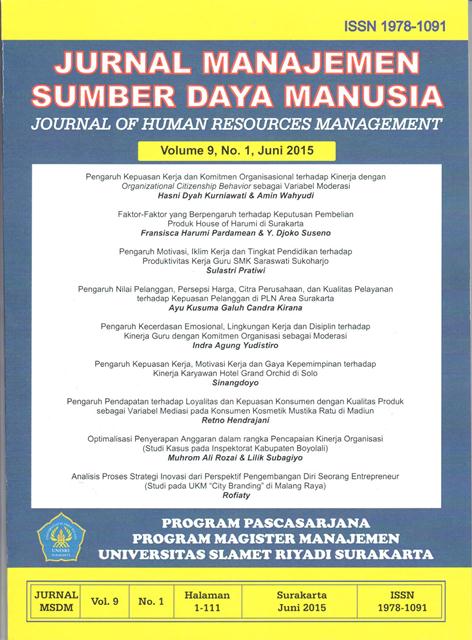ANALISIS PROSES STRATEGI INOVASI DARI PERSPEKTIF PENGEMBANGAN DIRI SEORANG ENTREPRENEUR (Studi pada UKM “City Branding†di Malang Raya)
Abstract
SMEs are business sector that is resilient to the turmoil of changes in environmental conditions, tough and can survive compared to large business and corporations, objective research to understand and analyze the innovation strategies of SMEs which constitute Malang city branding is based on the concept of self development in innovating. This study is a qualitative study, using the paradigm fenomology. The informants are Keripik Tempe Rohani in Malang, Petani Bunga and Pusat Makanan Oleh-oleh Vigor in Batu and Batik Druju in Malang. The research findings is the theme of legacy business, consumers and competitors theme, the theme of the income, while the conclusions are (1) the reasons that encourage SMEs to innovate is the legacy business, to anticipate consumer saturation and competition, and to increase revenue; and (2) the innovation strategy undertaken by SMEs. Keywords: process innovation strategy, the development of self entrepreneurs, SMEsDownloads
Published
2015-08-20
How to Cite
-, R. (2015). ANALISIS PROSES STRATEGI INOVASI DARI PERSPEKTIF PENGEMBANGAN DIRI SEORANG ENTREPRENEUR (Studi pada UKM “City Branding†di Malang Raya). JAMASADA: JURNAL MANAJEMEN SUMBER DAYA MANUSIA, 9(1). Retrieved from https://ejurnal.unisri.ac.id/index.php/Manajemen/article/view/1006
Issue
Section
Artikel
License
Authors who publish this journal agree to the following terms:
- Authors retain copyright and grant the journal right of first publication with the work simultaneously licensed under a Creative Commons Attribution License that allows others to share the work with an acknowledgement of the work's authorship and initial publication in this journal.
- Authors can separately make additional contractual arrangements for non-exclusive distribution published by the journal (e.g., publish it in a book), with an acknowledgement of its initial publication in this journal.
- Authors are allowed and encouraged to send their work via online (e.g., in the institutional repositories or their website) after published by the journal.













 Â
 
